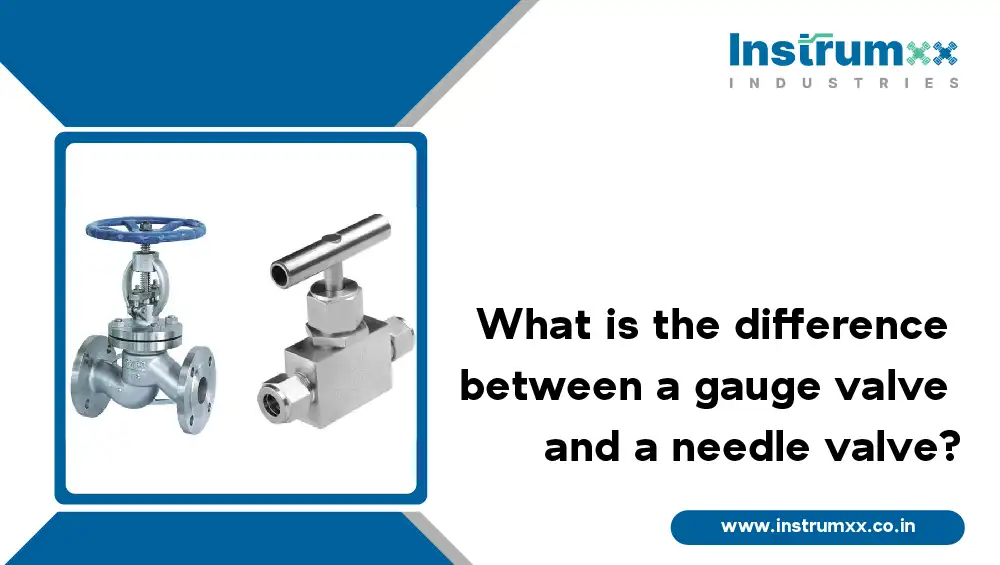Valves play a crucial role in controlling the flow of liquids and gases, in various engineering and industrial processes, Among the various types of valves, gauge valves, and needle valves are two commonly used options that serve distinct purposes. At Instrumxx Industries, a leading valves Manufacturer, Supplier, Stockist, and Exporter in India, we take immense pride in offering a diverse range of valves, including gauge valves needle valves, and more crafted to perfection in various sizes, specifications, standards, grades and materials like Titanium, Stainless Steel, Monel, Nickel, Inconel, Hastelloy, Aluminum, Copper, Brass, and Bronze so that our customers can choose the one that perfectly suits their project requirements!
This article aims to shed light on the key distinctions between Gauge Valves & needle valve essential valve types, aiding professionals and enthusiasts in selecting the right fit for their projects.
Gauge Valves: Precision Measuring and Isolation
Gauge valves, often referred to as pressure gauge valves or instrument gauge valves, serve a critical role in the realm of pressure measurement and calibration. These valves are designed with precision in mind, allowing operators to attach pressure gauges, transmitters, or other measuring instruments to a pipeline or vessel. The primary purpose of a gauge valve is to provide isolation, enabling the safe installation, removal, or replacement of measuring devices without disrupting the process flow.
Key Features of Gauge Valves:
- Pressure Isolation: Gauge valves isolate the pressure gauge from the process, protecting it from potential damage caused by corrosive or abrasive substances.
- Easy Calibration: These valves allow for straightforward calibration of pressure gauges without interrupting the process.
- Fine Control: Gauge valves offer the ability to fine-tune pressure measurements by adjusting the flow of fluid.
Needle Valves: Fine-Tuning Flow Control
Needle valves, on the other hand, are primarily utilized for precise flow control. These valves feature a slender, tapered needle-like stem that, when rotated, regulates the flow rate of fluid through the valve. This fine-tuning capability makes needle valves ideal for applications where precision and control are paramount, such as in laboratories or systems requiring gradual adjustments.
Key Features of Needle Valves:
- Precision Flow Regulation: The tapered stem of a needle valve provides exceptional control over the flow rate, allowing for gradual adjustments as needed.
- Leak Tightness: Needle valves are designed to provide excellent shut-off capabilities, minimizing leakage and preventing unwanted fluid loss.
- Variety of Applications: From gas and liquid control to regulating flow rates in specialized systems, needle valves find their place in diverse industrial settings.
Distinguishing Factors: Gauge Valves vs. Needle Valves
Now that we have explored the individual characteristics of gauge valves and needle valves, let's highlight the key differences between these two essential valve types:
- Primary Function: Gauge valves are primarily used for pressure measurement and instrument isolation, whereas needle valves excel in fine flow control and regulation.
- Flow Path: Gauge valves offer a straight-through flow path, minimizing pressure drop. Needle valves have a tapered flow path, providing precise control over the flow rate.
- Valve Design: Gauge valves typically feature a handwheel-operated design for easy installation and removal of pressure instruments. Needle valves have a stem that requires rotational movement for flow adjustment.
- Applications: Gauge valves are essential in scenarios where pressure measurement is critical, such as Pressure Measurement and Calibration, Process Control, Instrumentation and Testing, Chemical and Petrochemical Industries, Oil and Gas Applications, Power Generation, HVAC Systems, Water Treatment, Laboratory Equipment, Aerospace and Aviation, Semiconductor Manufacturing, and other applications.
- On the other hand, Needle valves shine in applications requiring meticulous control, such as Process Control, Laboratory Equipment, Instrumentation, Hydraulic Systems, Steam Applications, Aerospace Industry, Chemical Injection Systems, High-Pressure Systems, Cryogenics and Refrigeration, Automotive Industry, Fire Suppression Systems, Pressure Relief Systems and many more.
Choosing the Right Valve: Project Considerations
When deciding between gauge valves and needle valves, several factors come into play. Consider the following aspects to make an informed choice:
- Flow Rate: If your application requires consistent pressure monitoring with moderate flow rates, a gauge valve might be suitable.
- Precision Control: For fine-tuning flow and regulating high-pressure systems, a needle valve is the preferred option.
- Frequency of Adjustments: Gauge valves are optimal for processes that demand frequent adjustments, while needle valves excel in situations that require precise, infrequent changes.
Final Thoughts!..
Gauge valves and needle valves are crucial components of industrial valves. Gauge valves empower accurate pressure measurement and instrument isolation, ensuring the smooth operation of various processes. On the other hand, needle valves provide the finesse of controlled flow regulation, enabling precision in a wide array of applications. At Instrumxx Industries, we take pride in offering an exceptional range of valves, each designed to cater to specific needs while upholding the highest standards of quality, durability, and performance.
So, whether you're navigating the intricacies of pressure measurement or seeking to finely tune fluid flow, rest assured that Instrumxx Industries has the perfect valve solution for your project. Contact us today to explore our diverse catalog and experience excellence in valve technology.

 +91 9820101803
+91 9820101803
